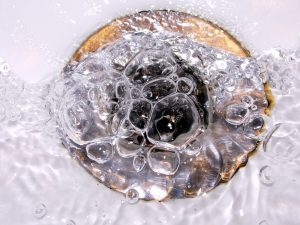
BATHROOM CLOGS
Bathroom clogs can be trickier to deal with than kitchen clogs, in part because they often occur in response to our normal grooming and similar toiletries. Human hair and soap can often combine to create a sticky mess in the drain, while toothpaste can solidify in the pipes and create a cement-like blockage that requires a create deal of work to clear.
The best preventative measure for your bathroom is to use a drain cover, especially in your tub or shower. It will catch hair and soap before it enters the drain and allow you to keep the drain clear. You should also refrain from pouring water from mopping or similar cleaning down your bathroom drains, since they’re more likely to result in serious clogs. That extends to any fibrous material: cotton swabs, baby wipes, toilet paper, feminine hygiene products and the like.
Finally, beware of inappropriate materials flushed down the toilet. Children at play can often flush down toys or similar objects, while excess toilet paper and human waste can make a tough clog as well. (If clogs caused by toilet paper are a common issue, look for fast-dissolving brands and avoid double-ply and similar “strong” types of toilet paper.)
KITCHEN CLOGS
Kitchen clogs are usually easier to deal with than bathroom clogs: created when foodstuffs are thrown down the drain in most cases. The easiest way to handle the issue it to simply toss certain foodstuffs in the trash instead of down the drain. You probably know not to dispose of meat bones and hard seeds like peach pits down the kitchen sink. Other foods to watch include:
- Fats, oils and grease, or FOG. People often pour them down the drain in liquid form when they’re hot, but when they cool in the pipes, they will solidify and create a tough clog.
- Rice and pasta often expand then whey get wet, and when they get tangled together they can often create a terrible clog.
- Fibrous vegetables. This includes things like potato peelings, celery stalks and the like. They can damage your garbage disposal as well as getting tangled up in the pipes themselves to create a clog.
- Coffee grounds. Like pasta, coffee grounds can absorb water and expand in the pipes, creating a clog. They can also get into the gears of your garbage disposal and make for an ugly repair bill.
Here in Bergenfield, NJ, plumbing clogs of all varieties can be swiftly dealt with by the friendly pros at BZ Dependable Plumbing & Heating Inc. Call our team today to set up an appointment!

